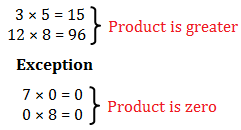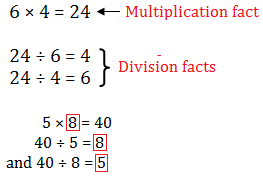Subscribe to our ▶️ YouTube channel 🔴 for the latest videos, updates, and tips.
Facts about Multiplication
We have learnt multiplication of numbers with 2-digit multiplier. Now, we will learn more. Let us know some facts about multiplication.
When each set of numbers are equal we use multiplication to find out the result.
The sign of multiplication is ×.
1. The result of multiplication is called product
e.g. 2 × 3 = 6 → (Product).
In multiplication, the number being multiplied is called the multiplicand and the number by which it is being multiplied is called the multiplier.
Example:
The answer of the multiplication is called the product.
2. The product of any number multiplied by a ‘zero’ is zero.
Multiplying any number by 0 will always give 0.
Example: 3 × 0 = 0 or 6 × 0 = 0
Think — If each child gets ‘zero’ sweets, how many sweets will 4 children get?
4 times 0 sweets or 4 × 0 = 0
3. Multiplying any number by 1 will always give that number itself.
The product of any number multiplied by ‘one’ is equal to the number itself.
Example:
7 × 1 = 7 or 9 × 1 = 9
Think — If every child gets ‘1’ sweet, how many sweets are needed for 8 children?
1 child → 1 sweet
8 children → 8 times 1 sweet
8 × 1 sweet = 8 sweets
Product is equal to the number itself.
4. In a multiplication operation, the product can be equal to the numbers being multiplied or greater than, but never the smaller, except when one of the number is zero.
Example:
5. For every multiplication fact there are two division facts.
Example:
Thus, the product divided by the multiplicand equals the multiplier and the product divided by the multiplier equals the multiplicand.
6. Product is always same even if the order of the numbers changes while multiplying.
In multiplication operation, the change in the order of the numbers being multiplied does not change the product.
Example:
6 x 3 = 18 is same as 3 x 6 = 18
9 × 8 = 8 × 9 = 72
12 × 5 = 5 × 12 = 60
Note:
The division fact is used for finding the missing multiplicand or multiplier.
Terms in Multiplication:
5 × 7 = 35
Here, 5 is called the multiplicand, that is, number of objects in each set.
7 is called the multiplier which tells us how many times a set occurs.
35 is called the product which gives the total number of objects.
In multiplication, the numbers which are multiplied together to give the product are called factors of the product.
Consider the product 3 × 7 = 21
Here, 3 and 7 are the factors and 21 is the product.
Properties of Multiplication:
Property I: The product of a number and 0 is always 0.
Example: 345 × 0 = 0
55 × 0 = 0
Property II: The product of a number and 1 is always the number itself.
Example: 92 × 1 = 92
1456 × 1 = 1456
Property III: The product of two numbers in any order will always be the same.
Example:
Property IV: The product of three numbers remains the same even when the grouping of the numbers is changed.
Example:
(4 × 9) × 5 = 36 × 5 = 180; 4(9 × 5) = 4 × 45 = 180
(4 × 9) × 5 = 4(9 * 5)
Questions and Answers on Facts about Multiplication:
1. Fill in the blanks - (One has been done for you)
a. 2 × 3 = 3 × 2
b. 5 × 4 = __ × 5
c. 6 × 2 = __ × 6
d. 7 × 5 = __ × 7
e. 9 × 6 = 6 x __
f. 10 × 4 = 4 × __
2. Multiply -
(i) 1 × 7 = ___
(ii) 6 × 2 = ___
(iii) 2 × 5 = ___
(iv) 4 × 9 = ___
(v) 7 × 5 = ___
(vi) 8 × 3 = ___
(vii) 7 × 8 = ___
(viii) 6 × 3 = ___
(ix) 8 × 8 = ___
(x) 3 × 7 = ___
(xi) 9 × 5 = ___
(xii) 8 × 10 = ___
(xiii) 4 × 5 = ___
(xiv) 9 × 10 = ___
(xv) 8 × 3 = ___
(xvi) 2 × 5 = ___
|
(xvii) 7 × 3 ____ |
(xviii) 6 × 4 ____ |
(xix) 8 × 8 ____ |
(xx) 10 × 2 ____ |
(xxi) 5 × 2 ____ |
3. Fill in the blanks-
(i) 3 × ___ = 18
(ii) ___ × 2 = 18
(iii) 2 × ___ = 14
(iv) ___ × 5 = 45
(v) 7 × 3 = ___
(vi) 4 × ___ = 20
From Facts about Multiplication to HOME PAGE
Didn't find what you were looking for? Or want to know more information about Math Only Math. Use this Google Search to find what you need.






New! Comments
Have your say about what you just read! Leave me a comment in the box below. Ask a Question or Answer a Question.